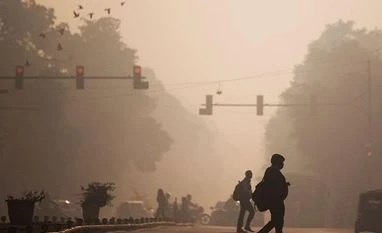Most state pollution control boards in the Indo-Gangetic Plain are "severely understaffed" and ill-equipped to perform critical functions despite having surplus funds every year, a new study has said.
The study by the independent Centre for Policy Research (CPR) found that a majority of the state pollution control boards (SPCBs) or pollution control committees (PCCs) turned a surplus for each of the last three years. Many struggled to spend the entire amount they collected through fees and other sources. Median fund utilisation rate (expenditure/revenue) was 48 per cent across all three years.
A substantial surplus generated each year by SPCBs is directed toward short-term fixed deposits rather than augmenting manpower, infrastructure, and equipment. An estimated Rs 2,893 crore was invested in fixed deposits by 10 SPCBs/PCCs as of 31 March 2021.
“The interest generated from these investments is essential to maintain a positive balance sheet for many SPCBs. This reliance on interest income constrains the ability of the Boards to allocate funds towards anything besides routine expenditure,” said CPR in a statement.
CPR analysed pollution boards' revenue, expenditure, investments, and financial autonomy over three financial years (FY19-FY21) in 10 states: Bihar, Chhattisgarh, Delhi, Haryana, Jharkhand, Punjab, Rajasthan, Uttar Pradesh, Uttarakhand, and West Bengal.
According to the study, pay and allowances for staff comprise over half of SPCB/PCC expenditure, with some skewing upwards of 80 per cent.
Also Read
Spending on new infrastructure, including laboratory facilities, is low. Just 11 per cent of total expenditure was on infrastructure with some exceptions and only 2 per cent was on research, development, and studies.
A majority of SPCBs get their revenue from consent fees and interest from fixed deposits, which constitute roughly 76 per cent of their revenue. SPCBs do not receive financial support from the government for infrastructure expansion, said CPR.
“In all but two cases, financial support was not provided by state governments to their respective SPCBs/PCCs. Central Government funding is sparse and is linked to existing centrally sponsored schemes,” it said.
It also highlights that the board member engagement in finances is insufficient. However, CPR finds that there is minimal focus on substantive issues such as finance in Board meetings.
“Achieving sustained improvement in air quality is contingent on our SPCBs functioning at their best, but this is unlikely unless they are fiscally healthy. Our research shows that in the absence of regular, untied financial support from State governments, SPCBs are highly reliant on fees and interest income. This creates a skewed incentive structure that deprives them of the financial and functional autonomy necessary to drive the improvements in air quality India needs,” said Bhargav Krishna, fellow at CPR.



)